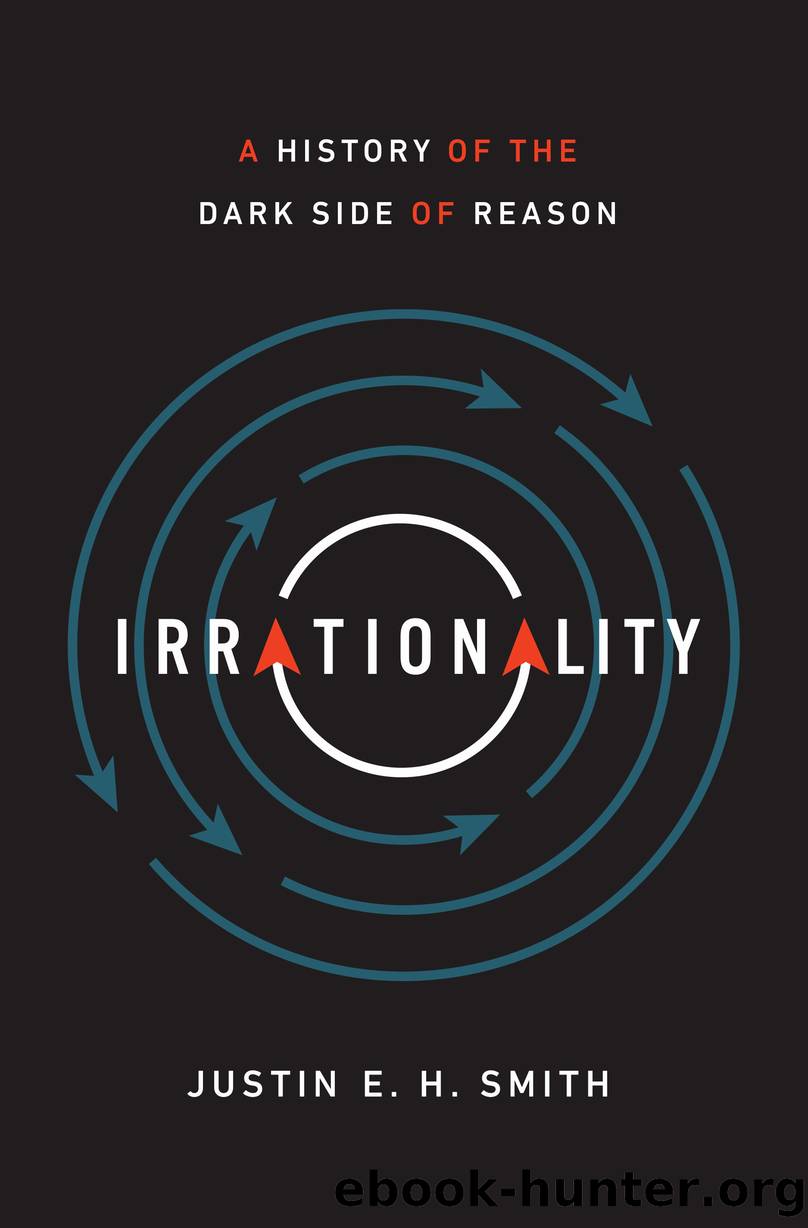Irrationality by Smith Justin E. H.;

Author:Smith, Justin E. H.;
Language: eng
Format: epub
Publisher: Princeton University Press
The World-Soul on Horseback
On October 14, 1806, Napoleonâs troops engaged Prussian forces in the Battle of Jena. Just under seven thousand French troops were killed or wounded, and around thirty-eight thousand on the Prussian side.14 The day before, G.W.F. Hegel had observed the French leader entering his quaint university town on horseback. In a letter to Friedrich Immanuel Niethammer, the philosopher would effuse: âI saw the emperorâthis world-soulâriding out of the city on reconnaissance.â15 This single individual, Hegel wrote, while âconcentrated here at a single point, astride a horse,â nevertheless âreaches out over the world and masters it.â16 What Hegel means by âworld-soulâ is complex and would draw us considerably off course if we were to attempt to do it justice. In brief, it is something like the philosophical reflection of the course of humanityâs development through history. It exists objectively, and not simply as the narrative that we give to history in order to make sense of it. And it encompasses both the emotional and the intellectual realms of human life. The history of the world is the history of the unfolding of this spirit. For it to be embodied or concentrated in a single person is for that person, by accident or by will, to come objectively to hold the destiny of the world in his hands.
That sometimes the weight of the world can fall into oneâs hands quite by accident is, some have argued, crucial for understanding Hegelâs take on Napoleon. This issue has lately been of some importance again in discussions of political leadership in Europe. In an October 2017 interview with the German magazine Der Spiegel, President Emmanuel Macron of France went into considerable detail in clarifying his position in relation to Napoleon Bonaparte. The German interviewers had asked him whether he agreed with Hegel that one man, such as the French emperor, can steer history. Macron denied that this is what Hegel said: âHe wasnât being nice to Napoleon,â Macron explains, âbecause he of course knows that history can outflank you.â17 Hegel had believed rather that an individual can âembody ⦠the zeitgeist for a moment,â but that âthe individual isnât always clear they are doing so.â18 Nonetheless, Macron reveals that he aims to do so himself, and to do so with clarity. âI think it is only possible to move things forward if you have a sense of responsibility. And that is exactly the goal I have set for myself: to try to encourage France and the French people to change and develop further.â19
Months of speculation about the new presidentâs Napoleonic ambitions could not have been more decisively confirmed. He goes on to declare that what must be restored (and what, presumably, Hegel had seen Napoleon as providing) are, precisely, âgrand narrativesâ of the sort that French postmodernist philosophers of a generation earlier, such as Jean-François Lyotard, had mocked and dismissed. In his 1979 book The Postmodern Condition, Lyotard had gone so far as to assert that the grand narratives that had supported the Enlightenment project are inherently unjust.
Download
This site does not store any files on its server. We only index and link to content provided by other sites. Please contact the content providers to delete copyright contents if any and email us, we'll remove relevant links or contents immediately.
| Administration & Medicine Economics | Allied Health Professions |
| Basic Sciences | Dentistry |
| History | Medical Informatics |
| Medicine | Nursing |
| Pharmacology | Psychology |
| Research | Veterinary Medicine |
Bioenergetica by Alexander Lowen(1123)
Noise: A Flaw in Human Judgment by Sunstein Cass R. & Sibony Olivier & Kahneman Daniel(968)
The Data Detective by Tim Harford(944)
The Child in You by Stefanie Stahl(883)
Chatter by Ethan Kross(798)
The Science of Rapid Skill Acquisition by Peter Hollins(639)
Freedom by Sebastian Junger(633)
No Bad Parts by Richard C. Schwartz(604)
The Montessori Baby by Simone Davies(565)
Evolution Gone Wrong: The Curious Reasons Why Our Bodies Work by Alex Bezzerides(560)
The Quantum Psychiatrist: From Zero to Zen Using Evidence-Based Solutions Beyond Medication and Therapy by Biswas Dona(551)
Maps of Meaning: The Architecture of Belief by Jordan B. Peterson(549)
The Science of Self-Learning: How to Teach Yourself Anything, Learn More in Less Time, and Direct Your Own Education (Learning how to Learn Book 1) by Peter Hollins(521)
Anxiety For Dummies by Charles H. Elliott & Laura L. Smith(512)
Sadomasochism and the BDSM Community in the United States by Stephen K. Stein(497)
Disconnected by thomas Kersting(481)
Why Sex Doesn't Matter by Olivia Fane(480)
The Mechanics of Passions: Brain, Behaviour, and Society by Alain Ehrenberg(480)
Jung - The Key Ideas: Teach Yourself (TY Philosophy) by Ruth Snowden(468)
